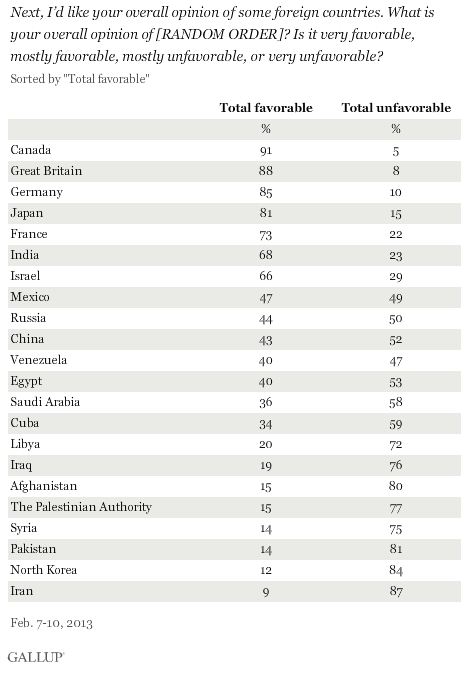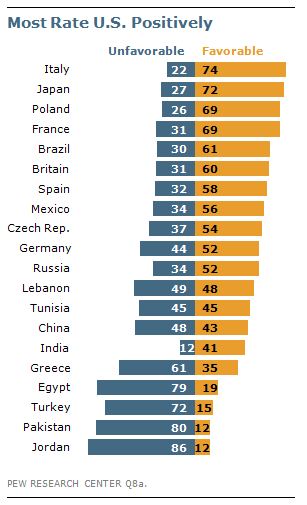Which Countries Do Americans Like? Do Other Countries Like Us?

March 8, 2013 5:24 pm (EST)

- Post
- Blog posts represent the views of CFR fellows and staff and not those of CFR, which takes no institutional positions.
More on:
Gallup is out with the results of a poll it did last month asking Americans whether they have favorable or unfavorable views about twenty-two other countries. Gallup has been asking this question every February for a dozen years, and the overall results have been consistent. Americans have a soft spot for fellow English-speaking countries, and they take a dim view of Middle Eastern countries.
Here is what Gallup reports:
Some quick observations:
- Americans like both Canadians and the British, but they like Canadians more. Fifty-three percent of Americans say that they have a “very favorable” opinion of Canada; the comparable figure for Britain is 43 percent. No other country has a “very favorable” rating higher than 25 percent.
- Americans hold France, a U.S. ally in World War II, in lower esteem than they do either of the two countries their forbearers fought in World War II, Germany and Japan. The good news for France is that its favorability rating is 40 points higher than it was ten years ago on the eve of the Iraq War.
- Americans are as divided about Mexico, their neighbor and third largest trading partner, as they are about China and Russia, two countries that have been far more hostile to U.S. interests and values around the globe. (Perhaps my colleague Shannon’s O’Neil’s forthcoming book, Two Nations Indivisible: Mexico, the United States, and the Road Ahead, will change how Americans think about Mexico.)
- Muammar Qaddafi’s ouster didn’t change how Americans feel about Libya. Only one in five Americans holds a favorable view of Libya today. That is roughly the same percentage as when Qaddafi ran the country.
- Americans don’t much care for Afghanistan, something that has been true since U.S. troops first toppled the Taliban. In Gallup’s last eleven favorability polls, Afghanistan’s favorability with the American public exceeded 28 percent just once, in 2005 when it hit 40 percent.
- Iran and North Korea can each claim to be America’s least favorite country. While Iran has the higher overall unfavorability rating, North Korea holds the higher “very unfavorable” rating (53 percent versus 48 percent).
So we know how Americans feel about the world. How does the world feel about America? Gallup didn’t ask this question, but the Pew Research Center has (though of a slightly different set of countries). Here is what Pew reported last June:
Pew’s findings in many ways are the inverse of Gallup’s. Americans don’t like Middle Eastern countries, and they don’t much like the United States. But there is one significant difference between the two polls: The British don’t have nearly the same level of affection for the United States as Americans have for Great Britain. Indeed, the French rate the United States significantly more positively than the British do.
This finding is not peculiar to Pew. A YouGov poll done last summer found that 40 percent of Britons selected “bullying” as the word they associated with the United States, and just 12 percent thought that the United States is defined by its respect for human rights. So the “special relationship” between the United States and Great Britain doesn’t look to be that special on the other side of the Atlantic. You are welcome to use the comment box below to speculate as to why.
More on:
 Online Store
Online Store


